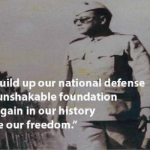Hero Worship, the Scourge of India.
How it has permeated our armed forces?
Sachin Tendulkar, the cricket icon of India, became the focal point of a countrywide uproar some years ago, when some umpire of the international cricket circuit accused him of ball tampering. There were processions and protests, even vandalism, by cricket fans in Mumbai and other cities, against ‘India being shamed’ by such a scandalous accusation against the country’s revered hero. I am not a cricket fan and don’t really know what the hell ball tampering is, but could surely make out it was a violation of a rule of the game. I could not however comprehend why people should treat an individual player being accused of foul play in a game as a matter of national pride. A game is a game and players may slip up on rules and invite penalty. What was there to feel offended about it? One could say that Indians are a cricket-crazy lot who lack proper sporting perspective, but the ugly fact is that the protests were symptomatic of a much graver national malady.
The culture of our land has been shaped by people paying obeisance to royalty, with no sense of individuality. There are no more kings and emperors left to bow to, but people still want their heroes to worship. They readily find them in the two most popular avenues of entertainment in the country, cricket and cinema and of course, politics, the ultimate arena of showmanship and hypocrisy. No wonder cricket players, movie stars and politicians, even lower ranking ones, can incite mass hysteria, although the former two may not do it intentionally. The tendency is so much in our DNA that it transcends over to people’s work environments as well. This explains the yes-boss syndrome, wherein hierarchy rules and individual initiatives are frowned upon. The saddest part is even our armed forces and corporate sector, which are rated high in efficiency index, are afflicted by it, not to mention bureaucracy, which is notoriously hierarchical in its style of functioning.
It needs no highbrowed analysis to deduce why we were always at the receiving end of foreign invasions and ended up being colonised; a people so complacent, given to herd-like submissiveness couldn’t expect any better for themselves. A bloody revolution to free ourselves from colonialism would probably have inculcated a spirit of individuality in us, which did not happen. The greatest contribution our ‘freedom fighters’ of the non-violent breed made for the cause was to sloganeer ‘Mahatma Gandhi ki Jai’ and ‘Bharat Mata ki Jai’, knowing pretty well that the worst that could happen to them was occasionally getting beaten up or thrown into jail by the police, and even these ‘brave-hearts’ formed a pitifully miniscule percentage of our enormously large population. Most people were comfortable sitting in their homes and singing praises of the ‘Angrez Sircar’ or the Indian National Congress, depending on which way the wind blew, fence-sitters to the core that they were. No wonder the British felt no great urge to abandon their princely life in India, until the Second World War rendered their duplicitous empire untenable. And ‘His Majesty’s Government’ found a convenient face-saving formula in the ‘Gandhian nonviolent struggle’ to extricate itself without losing its pants. In the euphoria of having ‘won’ the independence, the masses in India got carried away by the dominant political narrative of the times, which conveniently side-lined the inspiring stories of the valiant few who went the whole hog and sacrificed their lives in the cause of freedom. There was no major restructuring and the governance of the country continued more or less in the colonial mould. Thus, for the ordinary Indian, freedom did not mean much more than a change of government and there was no call for him to change his ways. He went on with his life as usual, always led, and never leading.
Gandhi went and Nehru came, and people found their new icon in him to sing the glory of and but naturally, he did what he liked, some good, some bad. An emperor couldn’t have been more powerful. A new political culture evolved when political bosses all over the country, took over the seats of power vacated by the agents of colonialism and bested the latter in looting the country. Nevertheless, the nation crawled forward to progress and prosperity along the avenues paved by the engine of democracy, howsoever muddled those were. Yet, we are not able to rid ourselves of the hero-worship syndrome. No wonder any jackass of a politician can hold people to ransom with a riffraff-following to do his or her bid. There are no principles or ideologies that define the behaviour of the Indian electorate. Who is able to manipulate how many is what matters.
Hero worship overshadows almost every sphere of human activity in India. Blockbuster movies often cast ‘super heroes’ and would have ridiculous screenplays that lionise them. Many movie stars even have ‘fan clubs.’ The national obsession with cricket and cricketing heroes leaves outstanding performers among other sportspersons barely receiving the acclaim they deserve. Even the intellectually superior publishing industry promotes authors who ‘sell’, by virtue of the popularity they have gained, not always by the quality of their writing, but for their ‘connections’ that ensure good reviews and media coverage. The publishers seldom risk promoting fresh talent.
While it could be argued that this kind of celebrity culture is universally rampant, we take the cake by having our armed forces contributing to it. No other country in the world has armed forces that get carried away by popular mood and liberally doles out honorary commissions to actors and sportsmen. It is an insult to our proud men and women in arms, who have time and again proved their mettle, to be globally rated one of the best in their profession. A commission in the armed forces is a coveted honour bestowed by the President of the country, upon young men and women who successfully undergo rigorous training to be considered worthy of it. The fact that no one in the armed forces top brass stood up to challenge such an absurd move by whoever at the top initiated or approved it, goes to show how badly even the armed forces have been susceptible to the herd mentality.
The armed forces are also guilty of not sharing battle narratives with the country at large in a manner that people get the right perspective, wherein the troops involved, units and formations, get their due acclaim, and not just a few individuals. All the information traditionally being made public by the armed forces are the locations of battles, a vague narrative that may or may not name the units or formations, highlighting the acts of those honoured for their gallantry, with the roll of honour listing those killed in action often published separately. This deprives the troops involved of due recognition for their collective bravery, which is what wins battles. Gallantry awards are secondary. All soldiers, per se, are brave. Awards are merely a matter of an individual soldier being at the right place at the right time. A well-trained and motivated unit functions like a well-oiled machine and does not require any special heroes. Our armed forces seem to miss out this point and routinely give out gallantry awards for acts under fire that should not amount to more than an individual performing his duty as expected of him. This has a demoralising effect on the rest of the soldiers involved, each of whom would have performed with equal or more zeal. Units are known to go into battles with citations prepared in advance and unscrupulous commanding officers find it a convenient tool to reward their favourites, since it is often difficult to ascertain the veracity of citations while the battles rage. It also encourages an unhealthy craving for awards, which leads to many foolish acts of bravado, inviting unwarranted casualties. Instances are many when commanders have risked the lives of their troops in reckless adventure to reap personal glory. For this reason, the Israeli Defence Forces do not have gallantry awards at all. With the armed forces narratives often woven around gallantry award winners, the public readily forms a hero-centred perception of war and never really understand the dynamics of combat. No wonder our civilian filmmakers, when they attempt war movies, are able to turn out only ridiculously cheap stunt films, with all kinds of chest thumping and melodrama.
The national hero-worship syndrome spawns yet another military narrative of the country when, with little interest in, or knowledge of, warfare and military history among the general public, one central military figure gets iconically glorified. The larger-than-life status accorded to Field Marshal Manekshaw in public perception of India’s historic victory of 1971 War is a case in point. Indeed, the field marshal was a great soldier and deserves praise for his leadership during the war as the army chief, but the way his role gets often overstated, tends to overshadow the brilliant contribution of many other stalwarts who played key roles. In fact, it was the brilliant operational plan devised by Lieutenant General JFR Jacob, the Chief of Staff to the Eastern Army Commander, that paved the way to victory in Bangladesh. It goes especially to his credit that he stood his ground with his blitzkrieg-like operational plan against initial objections from Sam Manekshaw himself (who preferred a conventional war of attrition) and managed to have his way. Of course, it also demonstrated Manekshaw’s inherent leadership quality of valuing sound professional advice of his juniors. Then again, when Jacob’s plan did not really propel on the ground at the expected speed, for lack of aggressiveness of many of the field commanders, it was Lieutenant General Sagat Singh, commanding the IV Corps advancing from Agarthala, who salvaged the situation, by a brilliant improvisation of transporting troops across River Meghna by helicopters, bringing about the speedy fall of Dacca, a feat that did not really get the attention it deserved. It’s easy to attribute the lack of public knowledge about such stories to the ‘fog of war’, but where Indian people are concerned, it would appear that their hero-worship syndrome dissuades them from seeking to learn anything beyond the talk of the town.
Maybe there is a case for the armed forces to bring to the fore the stories of collective bravery, how units and formations win great battles with grit and camaraderie, instead of trying to find individual heroes among soldiers who are all heroes in the first place.






Excellent article and so true
Thank you, ma’am
I would call it Cult Status. When any leader with larger than life proportions, have people who see him as as such, discard logic and blindly follow what is dictated, the mass just steam rolls everything in it’s path. It defies imagination how such a figure achieves this status. A recent example is how Hitler captured the imagination of his nation and powered Germany into adventures beyond their capability. It’s dangerous for a country to reach such a situation.
Indeed it is. A country like India is as much or more prone to such a catastrophe
Indeed it is. A country like India is as much or more prone to such a catastrophe!
Excellent
Thank you
“Units are known to go into battles with citations prepared in advance…” And so is the case with the IPL series!
Person-centric leadership is one of the reasons why the vast armies of the various yesteryear maharajas (and even mercenaries) turned tail the moment the ‘leader’ fell. Was there no efficient second line of command?
These provide great material for Bollywood ballads, but poor performance on the field.
Couldn’t agree more.